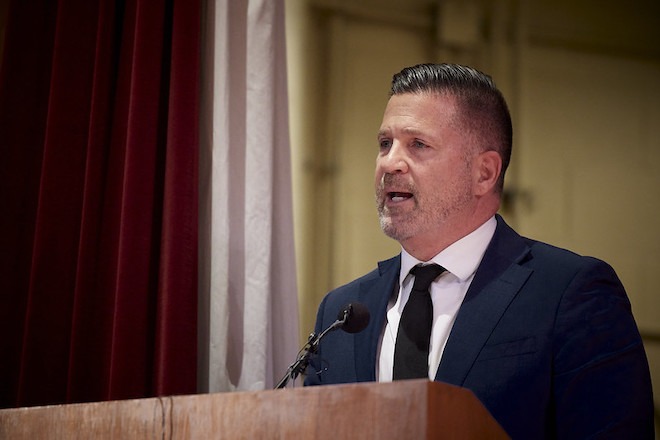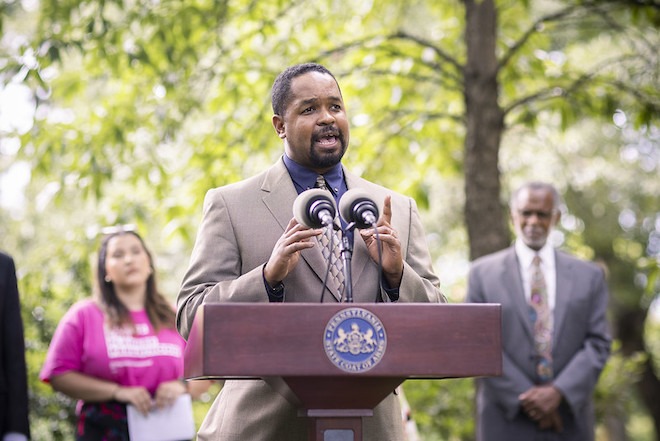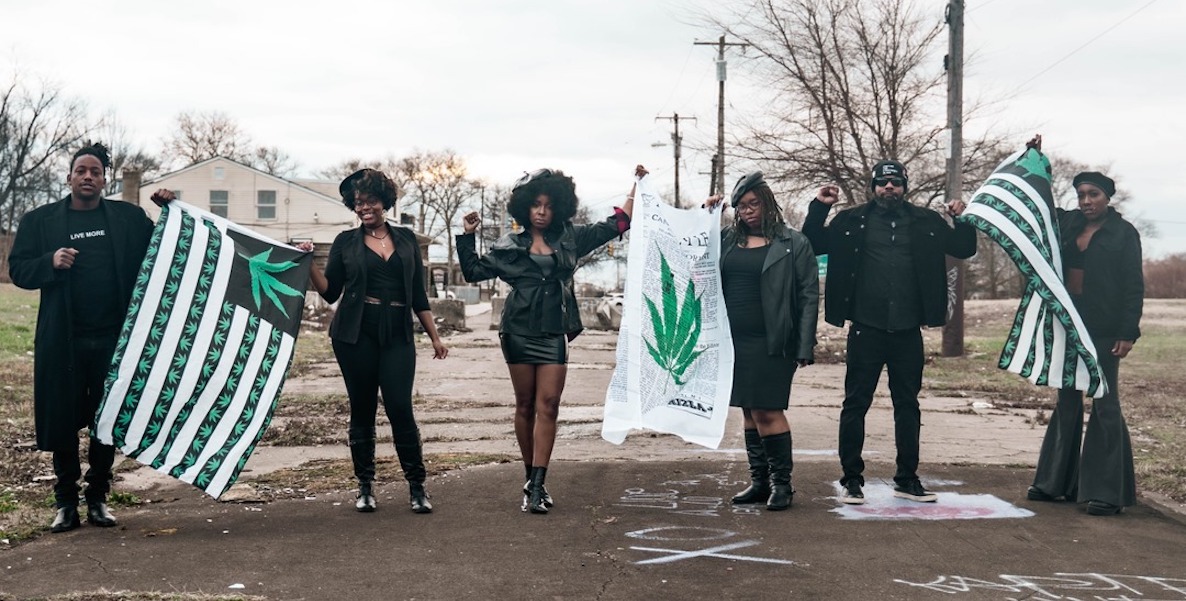In the beginning of this year, the effort to legalize recreational marijuana, also known as “adult-use,” in Pennsylvania finally seemed to have the momentum it needed to move forward.
A Franklin & Marshall poll showed that 63 percent of Pennsylvania voters back legalization, up three points from their last survey. In early February, Governor Josh Shapiro made the issue a cornerstone of his budget address. And shortly thereafter, some Republicans voiced optimism that a bipartisan agreement could be “getting close.”
Seven months later, legislators still have not sent a bill to Shapiro’s desk. Budget negotiations came and went without funding for legalized weed. And now time may be running out.

At the end of 2024, one of the biggest champions for legalization in the GOP-controlled state senate, Republican Mike Regan, will be stepping down. His likely replacement is another member of his party who has been a staunch opponent of legalization. Unless Democrats claim a surprise takeover of the Senate this November, the “math could be really precarious,” according to Meredith Buettner, the executive director of the Pennsylvania Cannabis Coalition. But, she added, “the numbers could potentially be there right now.”
So what’s holding up a vote? The short answer is that Democrats have yet to reach a consensus on how, exactly, to structure the legislation. After years of debate over the policy, key details of a would-be adult-use program — like who will be permitted to immediately grow and sell the plant, how it will be regulated, and how to rectify the harmful impacts of previous convictions related to pot, which have wrought havoc on lives and communities — are still garnering differences of opinion.

“I think everyone agrees it needs to happen,” says State Senator Sharif Street, who co-authored the first bipartisan piece of legalization legislation back in 2021 and remains a central figure in the negotiations. “We would have liked to get it done sooner, but I think Pennsylvania is going to be first to get it right.”
Street chalked up the delays to the regular sausage-making of a high-profile bill, adding that he’s “cautiously optimistic” about a deal getting done by the end of the year.
But there’s also the concerns of some members of the party, along with outside advocates, who want to see Pennsylvania set a new national standard of promoting social equity within the bill — and don’t believe it’s ready to do that. Over the summer, members of the Legislative Black Caucus held a press conference to make a demand of their colleagues: “do not legalize until you equalize” — one example of lingering apprehensions.
“I think it’s inevitable that an adult-use bill passes in Pennsylvania. But what it looks like, and if it’s good for people who have been over-policed, is an open question.” — Tony Payton Jr.
In keeping up with the ambitions of other states, Democrats plan to include a form of economic reparations in the adult-use program, by offering so-called “social equity applicants” — people who were formerly incarcerated for nonviolent crimes related to weed, along with residents of communities most harmed by the war on drugs — opportunities to obtain licenses and access to capital in the recreational market. Other goals for the program include a statewide expungement of criminal records related to low-level marijuana arrests, a system for safely regulating products, along with more tax revenue. The state predicts roughly $250 million in taxes each year from adult-use marijuana sales.
Other states have made similar promises, only to come up short. Most states have pulled in far less revenue than anticipated from adult-use sales. (Many of those states also saw a dip in tobacco and alcohol tax revenue after legalization.) They’ve also overwhelmingly failed to generate wealth for overpoliced neighborhoods so far. And the consequences for public health have not been immaterial. In states where adult-use legislation has passed, there’s been an uptick in hospitalizations and car crashes related to marijuana, despite the health benefits for individuals which can derive from the plant.
The blunders of other states are now the source of delays in Harrisburg over how to structure the bill appropriately and effectively.
“I think it’s inevitable that an adult-use bill passes in Pennsylvania,” says Tony Payton Jr., a former state representative and current entrepreneur in the cannabis industry. “But what it looks like, and if it’s good for people who have been over-policed, is an open question.”
Given the increasingly complex negotiations, the question begs asking: Is the effort to achieve recreational weed too ambitious?
A “gateway”
For most of the 20th century, the popularity of weed and the enforcement of its prohibition kept moving in opposite directions. Race played a large factor in both. In the 1930s, federal authorities launched a campaign claiming that “reefer makes darkies think they’re as good as white men” — one of many attempts by law enforcement over the century to denegrate the plant. Marijuana became a precursor to wider police surveillance, like stop-and-frisk, in communities of color. And yet the drug’s usage also spread in part due to its favorability among Black musicians.
In the 1970s and 80s, a heyday for tough-on-crime politicians, marijuana became Enemy #1 in the war on drugs. Politicians like Nelson Rockefeller, the governor of New York, demonized the plant as a gateway to addiction and lawlessness. Rockefeller’s drug laws — which included a mandatory sentence of 15 years (and up to a life sentence) for simple possession of marijuana and other drugs — became a national model for Presidents Richard Nixon and Ronald Reagan.
Weed was a gateway … to a mass incarceration system that overwhelmingly punished Black men. In the first decade of the 21st century, Black men were four times as likely as White men to be arrested for possession of marijuana, even while usage was found to be consistent across racial groups.
Increasingly over the past two decades, states across the country have been revisiting and reforming those laws. In 2016, Pennsylvania became the 24th state to create a comprehensive medical marijuana program for adults diagnosed with one of several dozen ailments. To qualify, Pennsylvanians must go through a specialized doctor to get a medical marijuana license, which gives them access to dispensaries throughout the state. But the state continues to treat possession of small amounts of pot as a third-degree misdemeanor, punishable by up to 30 days of jail time.
More than 10,000 Pennsylvanians are arrested each year for simple possession of marijuana, while thousands more remain behind bars due to pot-related violations of parole. “It’s not just the individuals who were incarcerated that have been affected, but their families and children too,” says Kristal Bush, a policy advocate, and organizer behind Black Cannabis Week, and founder of lifestyle brand Free My Weed Man. “We don’t need to wait for adult-use to roll out in order for us to expunge people’s records. You know, that’s something that can be done before.”
For many individuals and family members, those arrests have resulted in lost work, income, time with loved ones, as well as the degradation and psychic toll of over policing on individuals and neighborhoods.
Since 2012, the majority of states that established a medical marijuana program have gone on to pass subsequent reforms, either to fully decriminalize the drug statewide (ending the threat of jail time) or legalizing adult-use sales. One of those exceptions, of course, is Pennsylvania.
To be clear, the framework for legalizing recreational weed being discussed in Harrisburg includes clearing the record for people convicted of nonviolent possession of small amounts of marijuana, and decriminalizing weed moving forward. But achieving this one goal is caught in the maelstrom of advocates’ competing priorities for a comprehensive legalization bill.
“The fact that PA hasn’t done a mass state decriminalization and a mass expungement is the most disappointing thing,” says Tauhid Chappell, an adjunct professor at Thomas Jefferson University, who teaches a graduate course on the impacts of equity movements in the cannabis industry. “I feel like it’s one of the very low-hanging fruits to start addressing some of the generational harms [of cannabis enforcement].”
Learning from New York’s mistakes
As in many states, the push for recreational weed in Pennsylvania is complicated by the social equity provisions that some advocates are pushing to strengthen.
Other states have botched similarly bold initiatives. New York is the most glaring example. In March, 2021, the state passed a bill calling for half of all its recreational licenses to go to social equity entrepreneurs. The law also prevented large corporations from entering into the market for at least three years, to allow those entrepreneurs to gain a foothold. And to avoid some of the pitfalls of California’s legalization — where access to financing for small businesses was a prohibitive issue — New York created a $200 million fund that would dole out grants and low-interest loans.
But the New York program has quickly become a cautionary tale. Large companies challenged the law in court, straining resources and slowing the distribution of licenses. The state’s Cannabis Control Board, which oversees the program, struck a predatory deal with a private-equity firm in order to raise capital for its fund. As of this spring, there were only about 90 legal dispensaries across the state, many of which were in fact owned by social-equity entrepreneurs. The problem is that somewhere between 2,000 and 8,000 unlicensed shops — no longer fearing prosecution — have flooded the market as well, negating the advantage that those shops were supposed to receive.
“There’s going to be an increase in demand. Even if all the medical folks convert over, we don’t have enough dispensaries right now to satisfy the recreational customers.” — Rep. Emily Kincaid
It’s possible that Pennsylvania could structure a better program, and in fact, Street notes that the state “has the advantage of learning from what other states have done.” To that point, the framework for a bill being discussed in the House proposes a stable funding source, unlike in New York, for the capital program that would be dedicated to social-equity entrepreneurs. Those plans call for 30 percent of all tax revenue from recreational sales to funnel into a “cannabis business establishment fund.”
Yet there are unique conditions in PA that make the social equity goals harder to achieve. Namely, the state’s medical marijuana market is among the most robust in the country in terms of the numbers of dispensary locations and employees. The vast majority of those dispensaries are owned by multi-state corporations, which are eagerly awaiting the chance to hop into the recreational market. Most of those corporations are based in other states, and few — if any — are owned by people previously impacted by the war on drugs.
That spotty track record has led to criticisms from progressives and conservatives alike about the push for economic reparations. While some reject the idea outright — arguing that the law was the law, not to be retroactively corrected — others believe that politicians are disingenuously co-opting the idea. They fear an outcome where Pennsylvania’s adult-use ultimately enriches big corporations despite the rhetoric about equity.
To their credit, legislators are viewing the adult-use legislation as a way to correct for their errors in the past with the medical program. “Pennsylvania has no medical marijuana providers that are people of color or from disproportionately-impacted communities,” says Representative Emily Kinkead, a Democrat from the Pittsburgh area and one of the co-sponsors of the forthcoming House bill. “We must learn from the mistakes of the medical program and promote more diversity in the industry, especially where it can provide opportunities to communities that have been over-policed and over-criminalized.”
But the fear among some advocates is that these large corporations stand to dominate this new market and either box out or buy out these social equity entrepreneurs.
“If we’re going to talk about equity, then we have to wait until other small operators, like locally-owned businesses, essentially catch up,” says Chappell, echoing sentiments shared by members of the Legislative Black Caucus this summer. “And not just catch up in terms of getting licenses. They have to catch up in terms of market share, catch up in terms of revenue, and catch up in terms of profitability.” That, Chappell notes, given the exceedingly complicated regulations and requirements for a cannabis business, could take up to five years.
Other proponents of legalization, though, believe that corporate interests and new entrepreneurs can both succeed. “There’s going to be an increase in demand,” says Rep. Kinkead. “Even if all the medical folks convert over, we don’t have enough dispensaries right now to satisfy the recreational customers.”
Given the ongoing negotiations over what would be included in a bill this year, it is hard to see how Gov. Shapiro will have something to sign before the legislature turns over in January. In the meantime, Pennsylvania has the opportunity to be the first in the nation at a different approach — if legislators can get on the same page.
“I think you have enough votes in the Senate to pass strong criminal justice reform measures,” says Payton Jr. “Let’s start there — let my people go. And then we can pass something sensible that includes an option for the little guy to open a retail store. There’s nowhere else in the country where that’s happened.
“I would love for Pennsylvania to be a leader,” he adds. “But I’m realistic about it.”
![]() BUT HAVE YOU READ THE CITIZEN … ONNN WEEEEEED?
BUT HAVE YOU READ THE CITIZEN … ONNN WEEEEEED?



